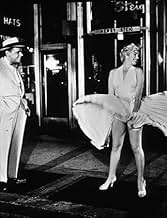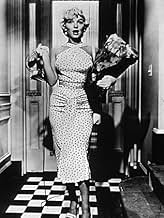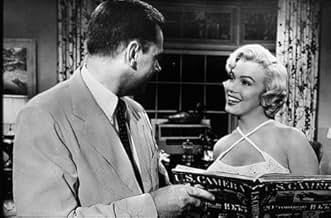IMDb-BEWERTUNG
7,0/10
44.756
IHRE BEWERTUNG
Als seine Familie den Sommer über verreist ist, wird ein bislang treuer Ehemann von einer schönen Nachbarin in Versuchung geführt.Als seine Familie den Sommer über verreist ist, wird ein bislang treuer Ehemann von einer schönen Nachbarin in Versuchung geführt.Als seine Familie den Sommer über verreist ist, wird ein bislang treuer Ehemann von einer schönen Nachbarin in Versuchung geführt.
- Nominiert für 1 BAFTA Award
- 2 Gewinne & 3 Nominierungen insgesamt
Tom Ewell
- Richard Sherman
- (as Tommy Ewell)
Dolores Rosedale
- Elaine
- (as Roxanne)
Brandon Beach
- Commuter at Station
- (Nicht genannt)
Steven Benson
- Kid at Train Station
- (Nicht genannt)
George Bruggeman
- Commuter at Station
- (Nicht genannt)
George Chester
- Porter
- (Nicht genannt)
Noble 'Kid' Chissell
- Train Station Gateman
- (Nicht genannt)
Richard Elmore
- Commuter at Station
- (Nicht genannt)
Duke Fishman
- Commuter at Station
- (Nicht genannt)
Empfohlene Bewertungen
Even after sixty years, THE SEVEN YEAR ITCH retains its freshness and bounce - a delightful testament both to the script (by Billy Wilder and playwright George Axelrod) and the quality of the performances.
The story is a simple one: left on his own during a hot New York summer, Richard Sherman (Tom Ewell) tries his best to avoid the temptations of drink, tobacco and an extra-marital affair. However his best intentions are frustrated by the presence of The Girl (Marilyn Monroe), who has moved into the apartment above him. Nothing actually happens, but the promise persists ...
Ewell gives a stellar performance, the best in his forty-five year acting career. In his rumpled gray suit, with tie askew, he embarks on a series of monologues where his better nature competes with his carnal desires. Most of them are shot in single takes in the Shermans' apartment: Ewell's India-rubber face changes rapidly as he debates the morality of inviting The Girl down for a drink. He walks from side to side of the frame, his shoulders hunched, almost as if he is bearing the cares of the world on his back.
The fantasy-sequences are extremely funny, with Ewell imagining himself as the protagonist in a comic reworking of FROM HERE TO ETERNITY, rolling about on the beach with a woman not his wife. Later on he casts himself as a Noel Coward-like figure speaking in a cod-British accent, as he plays Rachmaninov on the piano while trying to seduce The Girl (a reference to BRIEF ENCOUNTER).
When the latter scene is re-enacted for real, The Girl is completely uninterested in Rachmaninov. Sherman tries to embrace her, and the two of them end up falling off the piano bench in an ungainly heap. Although Sherman imagines himself as the Great Lover, he will never be able to fulfill his role.
Monroe is equally memorable in her role as the not-so-dumb blonde from Denver. It's clear she is attracted to Sherman - not because of his physical attributes, but because at heart he is an extremely sweet man. On the other hand she respects his love for his wife Helen (Evelyn Keyes), and thus refrains from making a pass at him. THE SEVEN YEAR ITCH contains the memorable sequence where she stands over a grille and lets the wind from a subway train beneath blow up her white dress. Wilder shoots this sequence very discreetly, leaving everything to the viewer's imagination. Monroe is far more seductive in an interior sequence, where she hides behind a chair and stretches out one leg, and then another. The janitor Mr. Kruhulik (Robert Strauss) witnesses what happens, and promises to leave Sherman alone.
Wilder's and Axelrod's script fairly crackles with one-liners, as well as a series of in-jokes referring to Charles Lederer (Wilder's fellow-scriptwriter), as well as a reference to Monroe herself.
THE SEVEN YEAR ITCH is one of those comedies that never loses its sparkle, even after repeated viewings.
The story is a simple one: left on his own during a hot New York summer, Richard Sherman (Tom Ewell) tries his best to avoid the temptations of drink, tobacco and an extra-marital affair. However his best intentions are frustrated by the presence of The Girl (Marilyn Monroe), who has moved into the apartment above him. Nothing actually happens, but the promise persists ...
Ewell gives a stellar performance, the best in his forty-five year acting career. In his rumpled gray suit, with tie askew, he embarks on a series of monologues where his better nature competes with his carnal desires. Most of them are shot in single takes in the Shermans' apartment: Ewell's India-rubber face changes rapidly as he debates the morality of inviting The Girl down for a drink. He walks from side to side of the frame, his shoulders hunched, almost as if he is bearing the cares of the world on his back.
The fantasy-sequences are extremely funny, with Ewell imagining himself as the protagonist in a comic reworking of FROM HERE TO ETERNITY, rolling about on the beach with a woman not his wife. Later on he casts himself as a Noel Coward-like figure speaking in a cod-British accent, as he plays Rachmaninov on the piano while trying to seduce The Girl (a reference to BRIEF ENCOUNTER).
When the latter scene is re-enacted for real, The Girl is completely uninterested in Rachmaninov. Sherman tries to embrace her, and the two of them end up falling off the piano bench in an ungainly heap. Although Sherman imagines himself as the Great Lover, he will never be able to fulfill his role.
Monroe is equally memorable in her role as the not-so-dumb blonde from Denver. It's clear she is attracted to Sherman - not because of his physical attributes, but because at heart he is an extremely sweet man. On the other hand she respects his love for his wife Helen (Evelyn Keyes), and thus refrains from making a pass at him. THE SEVEN YEAR ITCH contains the memorable sequence where she stands over a grille and lets the wind from a subway train beneath blow up her white dress. Wilder shoots this sequence very discreetly, leaving everything to the viewer's imagination. Monroe is far more seductive in an interior sequence, where she hides behind a chair and stretches out one leg, and then another. The janitor Mr. Kruhulik (Robert Strauss) witnesses what happens, and promises to leave Sherman alone.
Wilder's and Axelrod's script fairly crackles with one-liners, as well as a series of in-jokes referring to Charles Lederer (Wilder's fellow-scriptwriter), as well as a reference to Monroe herself.
THE SEVEN YEAR ITCH is one of those comedies that never loses its sparkle, even after repeated viewings.
Peak Marilyn. She's funny, sexy, and absolutely charming, and it's also of course got that iconic moment over the subway grate. I've also always liked Tom Ewell in this. As silly as his character is and as stagey as his monologues are, I think he's funny and satirizes married men with wandering eyes pretty well. He has ridiculous fantasies, clumsily tries to put the moves on a younger woman, and is wracked by guilt. I absolutely love the scene where he plays Rachmaninoff's Piano Concerto #2 to set the mood (both in fantasy and reality), and how it was incorporated into the soundtrack. Another nice little moment is when he's fixing a couple of Tom Collins for the two of them, going on about how it couldn't have been chance for them to have met, while she's talking to herself about needing to return a fan to a store. I like how spare the story is, and the various one-liners in the script. Director Billy Wilder lamented making the film under the Production Code, and it is a shame that some things were censored, but Monroe's appeal can't be denied. I like it for what it is, a product of its time for sure, and a harmless sex comedy.
Favorite line: "Miss Morris, I'm perfectly capable of fixing my own breakfast. As a matter of fact, I had a peanut butter sandwich and two whiskey sours."
Favorite line: "Miss Morris, I'm perfectly capable of fixing my own breakfast. As a matter of fact, I had a peanut butter sandwich and two whiskey sours."
In Some Like it Hot, Marilyn was the hottest she ever was. In Gentlemen Prefer Blondes, she's the Woman of all Women. But in The Seven Year Itch, Marilyn is the prize of all treasures. She is timeless in every frame of the film. Coming across as this unique, cute, and innocent little woman, Marilyn makes your mind race, your heart thump, and your youth return.
No one else but Marilyn Monroe could play "The Girl" in the movie. She is just that, a girl, but much much more. Most of the physical comedy in the film is executed by Monroe herself. A lot of us don't realize this as we expect most of the comedy to come from the comedian in the film, Tom Ewell. A must see if you are a fan of America's first Dream Girl, the amazing Marilyn Monroe.
No one else but Marilyn Monroe could play "The Girl" in the movie. She is just that, a girl, but much much more. Most of the physical comedy in the film is executed by Monroe herself. A lot of us don't realize this as we expect most of the comedy to come from the comedian in the film, Tom Ewell. A must see if you are a fan of America's first Dream Girl, the amazing Marilyn Monroe.
In summertime in Manhattan, the plain and average Richard Sherman (Tom Ewell) sends his wife and son for vacation in the country. Sherman is the key man of a publishing firm, Brady & Company, which publishes cheap pocket books. The faithful Sherman has a routine life with his family and dreams on being successful with women. When a beautiful and sexy blonde lodges the upstairs apartment of his small building, Sherman first opens the front door for her and then he invites her to have a drink with him after the fall of her tomato vase on his chair on the backyard. Along the days, he spends some time with the girl and feels tempted by her, but later he misses his family and travels to meet them.
"The Seven Year Itch" is a naive and innocent romantic comedy in accordance with the contemporary moral standards, but actually this feature tested the limits of censorship in a time when Hollywood was ruled by a rigid moral code. The story is based on a George Axelrod popular 1952 Broadway play about a man that has an affair with his upstairs neighbor. Unfortunately in the 50's, the American cinema did not have the same artistic freedom as theater. The screenplays and movies were submitted to the scrutiny of the powerful Hayes office, the censorship of Hollywood. There was a Production Code in Hollywood that stated that adultery should not be the subject of comedy or laughs, and this story violated the Code. Billy Wilder was fascinated by this story and purchased the rights of George Axelrod. However, to make the movie was a challenge for this great director, since many scenes and lines were ripped away by the censorship and by the National Legion of Decency, mutilating the plot.
Marilyn Monroe was selected to the cast, but Billy Wilder wanted a plain, average and non-handsome actor for the role of Sherman. His first choice was Walter Matthaus, but Fox direction did not want to take the risk of an unknown lead actor, therefore they selected Tom Ewell. The most famous scene of Marilyn Monroe, with her dress being lifted by the air of the subway, was first an exterior scene, but later Billy Wilder needed to shot again in the set because the noise and whistles of the viewers spoiled the original footage. This external scene also provoked the end of the marriage of Marilyn with Joe Dimaggio, who felt humiliated with the manifestation of the public.
One dialog that I particularly like is when Sherman and the blonde leave the movie theater and she says that the creature needed to be loved, in an analogy between Sherman and the creature of the black lagoon. The restored DVD is fantastic and this is the most sexually suggested role of Marilyn Monroe to date. My vote is seven.
Title (Brazil): "O Pecado Mora ao Lado" ("The Sin Lives on the Next Door")
"The Seven Year Itch" is a naive and innocent romantic comedy in accordance with the contemporary moral standards, but actually this feature tested the limits of censorship in a time when Hollywood was ruled by a rigid moral code. The story is based on a George Axelrod popular 1952 Broadway play about a man that has an affair with his upstairs neighbor. Unfortunately in the 50's, the American cinema did not have the same artistic freedom as theater. The screenplays and movies were submitted to the scrutiny of the powerful Hayes office, the censorship of Hollywood. There was a Production Code in Hollywood that stated that adultery should not be the subject of comedy or laughs, and this story violated the Code. Billy Wilder was fascinated by this story and purchased the rights of George Axelrod. However, to make the movie was a challenge for this great director, since many scenes and lines were ripped away by the censorship and by the National Legion of Decency, mutilating the plot.
Marilyn Monroe was selected to the cast, but Billy Wilder wanted a plain, average and non-handsome actor for the role of Sherman. His first choice was Walter Matthaus, but Fox direction did not want to take the risk of an unknown lead actor, therefore they selected Tom Ewell. The most famous scene of Marilyn Monroe, with her dress being lifted by the air of the subway, was first an exterior scene, but later Billy Wilder needed to shot again in the set because the noise and whistles of the viewers spoiled the original footage. This external scene also provoked the end of the marriage of Marilyn with Joe Dimaggio, who felt humiliated with the manifestation of the public.
One dialog that I particularly like is when Sherman and the blonde leave the movie theater and she says that the creature needed to be loved, in an analogy between Sherman and the creature of the black lagoon. The restored DVD is fantastic and this is the most sexually suggested role of Marilyn Monroe to date. My vote is seven.
Title (Brazil): "O Pecado Mora ao Lado" ("The Sin Lives on the Next Door")
A conclusion I came to some time ago (and that doesn't seem to be reflected in any of the other reviews here) is that the whole story is a dream, a waking fantasy, on the part of Richard Sherman (Tom Ewell). There were no scenes where there is any objective confirmation of the existence of the Marilyn Monroe character, where anyone else could confirm any of the events between them; even the scene where Kruhulik (Robert Strauss) walks in is just the three of them, and Kruhulik is drunk, thus unreliable as a witness. Add to that the fact that Marilyn's character has no actual name, and is only referred to in the credits as "the girl", leads me to believe that the whole thing is Sherman's fantasy, that "the girl" never actually existed, that it's all a guilt-driven fantasy on the part of a 39-year-old middle-class white guy confronted with a "summer bachelorhood" in the City without his family. 🤔😉😊
Wusstest du schon
- WissenswertesBilly Wilder preferred shooting in black and white, but Marilyn Monroe's contract with Fox called for all of her movies to be shot in color. Monroe always thought that she looked far more attractive and glamorous in color than in black and white.
- PatzerBoth Richard and his boss, who are in the book publishing industry, refer to "The Portrait of Dorian Gray". The actual title of the Oscar Wilde novel is "The Picture of Dorian Gray".
- Crazy CreditsWhen the title appears, one arm of the T in ITCH reaches down and scratches the stem of the letter.
- Alternative VersionenVersion released in then West Germany contains some profanity.
- VerbindungenFeatured in Die Welt der Marilyn Monroe (1963)
- SoundtracksPiano Concerto #2
Composed by Sergei Rachmaninoff (as S. Rachmaninoff)
Played on a record and often in the score
Top-Auswahl
Melde dich zum Bewerten an und greife auf die Watchlist für personalisierte Empfehlungen zu.
Details
- Erscheinungsdatum
- Herkunftsland
- Sprache
- Auch bekannt als
- La comezón del séptimo año
- Drehorte
- 164 East 61st Street, Manhattan, New York City, New York, USA(exterior of Richard's apartment)
- Produktionsfirmen
- Weitere beteiligte Unternehmen bei IMDbPro anzeigen
Box Office
- Budget
- 1.800.000 $ (geschätzt)
- Weltweiter Bruttoertrag
- 22.277 $
- Laufzeit1 Stunde 45 Minuten
- Farbe
- Seitenverhältnis
- 2.55 : 1
Zu dieser Seite beitragen
Bearbeitung vorschlagen oder fehlenden Inhalt hinzufügen





































